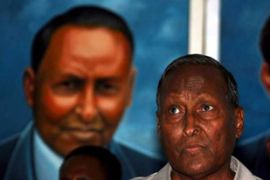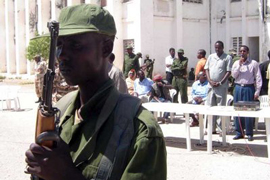UN heads to Somalia peace talks
Presence of Ethiopian troops in Somalia continue to be a sticking point in talks.

On Sunday, mortars were fired at the plane carrying Abdullahi Yusuf Ahmed, the interim president, to the talks in Djibouti.
Yusuf was unharmed, but the incident highlighted the risks facing politicians in Somalia.
Battle for control
Somalia has been without a central government since Mohamed Siad Barre, the country’s president, was overthrown in 1991. A civil war ensued that has lasted for nearly two decades.
The most recent attempt to put an end to the fighting was derailed by a battle between the transitional federal government (TFG) and the Union of Islamic Courts (UIC) which briefly took control of most of the country in late 2006.
Ethiopian troops were then deployed to the country to support the weaker forces of the TFG. They, along with Somali troops, pushed fighters loyal to the UIC out of Mogadishu, the capital, in early 2007.
However, Somalia’s mainly Islamist opposition remains a potent force in the country and a continuing threat to Yusuf’s government, which is backed by the EU and the US.
According to aid agencies, at least 6,500 people have been killed in the past year and more than one million Somalis have become refugees in their own country, the vast majority having fled violence in Mogadishu.
Pessimism
 |
| Doubts remain as to whether the Djibouti talks will put a halt to the fighting [EPA] |
Although political figures such as Yusuf and members of the opposition will be present, other opposing factions, such the al-Shabab, the military wing of the UIC, and members of the Alliance of the Re-Liberation of Somalia, a group linked to the UIC, are boycotting the talks.
They claim the negotiations can go nowhere until Ethiopian troops backing the government withdraw from Somalia.
The divided opposition and the failure of previous attempts at negotiating peace are among the reasons many are pessimistic about the chances of a breakthrough in Djibouti.
At least 14 previous attempts to get all the rival Somali parties to form a stable government have failed.
Sticking points
But in some quarters, there is greater optimism about the new round of talks under the auspices of Ahmedou Ould-Abdallah, the UN envoy to Somalia, and with Security Council members there for support.
Ahmed Abdisalam, the TFG’s information minister, was hopeful.
“We are the ones who fought, so we should reconcile for the sake of our people and country. This time, we hope it is a good chance for us,” he said.
Sheikh Mohamud Sheikh Ibrahim, a senior UIC figure, said: “We support the talks in Djibouti with the UN on how the Ethiopians would withdraw from our territory, and also welcome an independent broad-based reconciliation among Somalis.
“But we see the deployment of any other foreign troops would be meaningless.”
The TFG has been lobbying for UN peacekeepers to replace a 2,600-strong African Union force now in Somalia.
In early May, the Security Council unanimously approved a resolution saying it will consider deploying UN peacekeepers “at an appropriate time”, subject to progress in improving political reconciliation and security conditions on the ground.